Our RV Solar Calculator
Welcome to our RV solar calculator, a free tool designed to help you estimate the size of the solar panels you need to replenish your RV battery bank. Ensure that you have sufficient solar power generation to supply the daily power requirements of your RV electrical system.
I hope you read my article on RV solar panels. If you did, you understand the different types of panels and their pros, cons, and limitations. If not, take the time to find the best solar panel type for your needs and budget. Now, it’s time to determine the quantity and capacity of the panels you need for your RV solar array.
To do that, calculate how much power your coach uses when not plugged into shore power. Then, a conversion needs to be performed to translate that total power consumption to a per-panel capacity based on the number of panels in the array and the estimated peak sun hours you will have available.
RV Solar Calculator
See below the calculator for detailed instructions.
* Use one of the free solar calculator below in the article to get personalized solar estimates for your location.
How to use the RV Solar Calculator to Choose the Correct RV Solar Panels
In the first part of the calculator, for every appliance you intend to power on board your motorhome or travel trailer, enter the quantity of each one and the amount of time you estimate you will have them running on an average day. This will result in a total of your daily power usage.
Next, enter the number of solar panels you plan to have on the coach, the type of batteries you will be charging, and the type of solar panel you are considering. The type of battery and panel is needed because battery types have different charging efficiencies, and solar panels have different generating efficiencies.
The calculator also needs to know the estimated Peak Sun Hours (PSH) you have available where your RV will be traveling. See below for some online peak sun hour estimators/calculators.
The calculator will return the wattage rating for each panel in the array needed to replenish the batteries over the day. I recommend oversizing this number when you decide on panels to have some headroom for excess usage or electrical additions to the coach.
Note: For the first step, we have used wattage values slightly higher than the average for each load in this RV solar calculator. However, it would help if you double-checked each wattage rating on your appliances. I know this sounds like a lot of work, but having sufficient solar power to replenish the watts that you use is essential to your safety. You don’t want an undersized solar array; you want a sufficiently large RV solar configuration to protect you and your loved ones.
Peak Sun Hours Calculators
Here is a selection we found of some peak sun hour calculators from residential solar companies that will enable you to estimate the peak sun hour values for where you live or where you will be traveling:
Use these FREE Tools to DETERMINE PSH for your PaRKED locationFree Peak Sun Hours Calculators
Unbound SolarClick Here
Smart Green SolarClick Here
Solar Story
Click Here
TO BE EDITED: My Picks for the Best RV Solar Panels
Best Portable Solar Panel
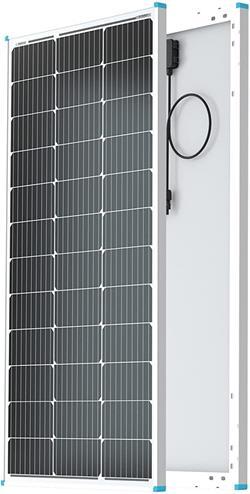
Renogy 100W 12V Monocrystalline Portable Solar Panel Suitcase
This highly portable option is ideal for RVers who need a flexible setup. It’s easy to transport and set up, and the built-in kickstand allows for optimal sun exposure. It’s also compatible with most deep-cycle batteries.
- Pros: Lightweight, foldable, built-in charge controller
- Cons: Limited to 100W, so you may need multiple units for high power demands
Best Roof-Mounted Solar Panels
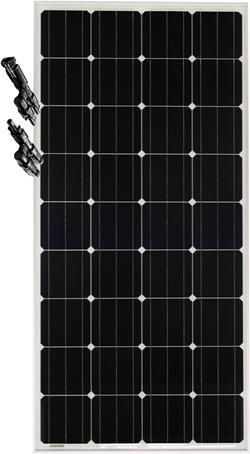
Go Power! 190W Solar Panel Kit
This is a top choice for RVers looking for a roof-mounted, permanent solar solution. It’s a high-efficiency monocrystalline panel with great durability and performance.
- Pros: High efficiency, durable, weather-resistant, easy installation
- Cons: Higher upfront cost, permanent installation may not suit every user
Best Solar Kits with Charge Controllers
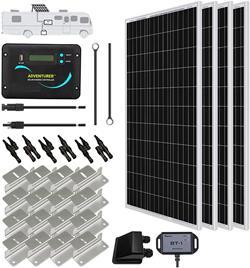
Renogy 400W Solar Starter Kit
This kit is perfect for those wanting an all-in-one system that includes four 100W panels, a charge controller, wiring, and mounting hardware. It’s designed to be user-friendly, even for beginners.
- Pros: Complete kit, high power output, good for off-grid applications
- Cons: Requires space for mounting multiple panels
Best Flexible Solar Panels
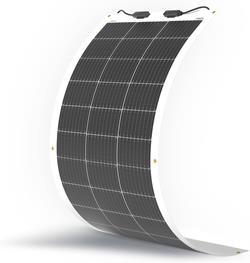
Renogy 100W Flexible Solar Panel
One of the best flexible options on the market, this Renogy panel is thin, lightweight, and able to bend up to 248 degrees, making it great for curved RV surfaces.
- Pros: Lightweight, flexible, easy to install on irregular surfaces
- Cons: Less efficient than rigid panels, may degrade faster in harsh weather conditions
Best Solar Generator
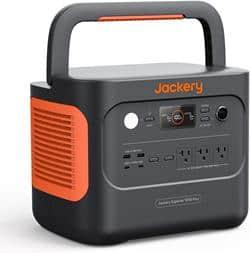
Jackery Explorer 1000 Portable Power Station with SolarSaga 100W Solar Panels
This solar generator kit is highly portable and perfect for RV travelers needing both power storage and solar charging. It includes two 100W solar panels and a 1000Wh lithium-ion battery pack.
- Pros: Portable, versatile, built-in inverter, high capacity battery
- Cons: Relatively heavy and expensive for long-term off-grid use
Best Solar Battery Chargers
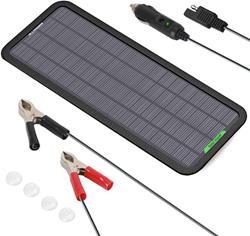
ALLPOWERS 18V 12W Solar Battery Maintainer
Designed to keep your RV batteries topped up, this trickle charger prevents battery drain during storage or low-use periods. It’s ideal for maintaining your battery’s health rather than powering devices.
- Pros: Affordable, easy to use, prevents battery drain
- Cons: Low power output, not designed for heavy-duty power needs
For a complete list of recommendations for RV Solar, see this article.
My Picks for the Best RV Deep Cycle Batteries
Best RV Battery under $200
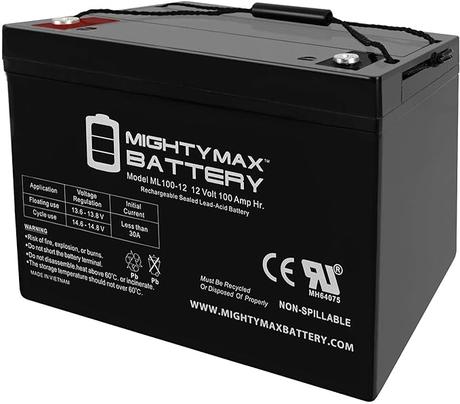
Mighty Max ML100-12 12V 100AH SLA Battery
Best 12V AGM Deep Cycle Battery
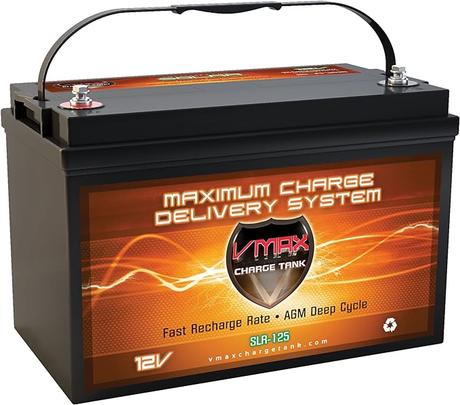
VMAX 12V 125Ah AGM Deep Cycle Battery
Best 6V Deep Cycle Battery
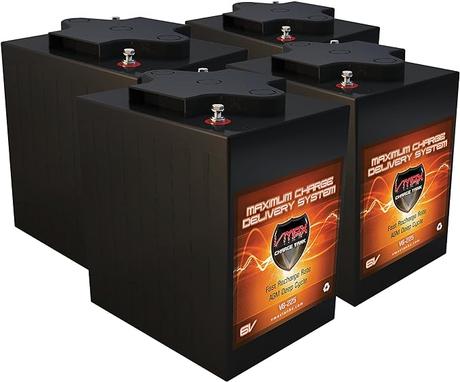
Vmaxtanks 6V AGM Battery
Best RV Lithium Battery
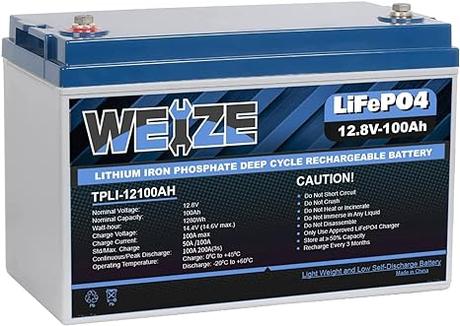
WEIZE 12V 100AH LiFePO4 Lithium Battery
Best RV Battery for Boondocking
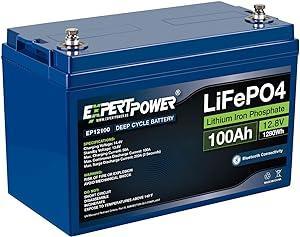
ExpertPower 12V 100Ah Lithium LiFePO4 Deep Cycle Battery
Best Battery for RV Solar

Battle Born LiFePO4 RV Battery
For a complete list of recommendations for RV batteries, see this article.
RV Solar Calculator FAQs
How do I calculate how much solar power I need for my RV?
To calculate the amount of solar power you need for your RV, you can follow this formula (the process that we use in our calculator above on this page):
Determine your daily energy consumption in watt-hours (Wh). Include all the appliances and devices you’ll use, such as lights, refrigerator, TV, etc. Please note their power consumption in watts (W) or kilowatts (kW).
Estimate the number of hours you’ll be using each device per day. Multiply the power consumption of each device by the number of hours of usage to get the energy consumption in Wh.
Add up the energy consumption of all devices to get your total daily energy consumption in Wh.
Consider the average daily sunlight hours in your location. You can obtain this information using one of the PSH calculators above.
Divide your total daily energy consumption by the average daily sunlight hours to calculate the approximate solar panel capacity you need in watts. This step will give you an estimate of the solar power required to meet your energy needs.
Remember, this is a rough calculation and does not account for weather conditions, system efficiency, or battery storage. I recommend consulting a solar professional to assess your requirements accurately.
Use our RV solar calculator above to perform a detailed calculation considering individual power draws, battery and solar panel charging and generation efficiencies, and the number of panels in the array.
How many solar panels do I need to run a 30-amp RV?
To run a 30-amp RV, you typically need around 300-400 watts of solar power. However, this depends on the power draw for all your appliances, lights, etc. Use our RV solar calculator to get an accurate estimate of your needs.
What will 400 watts of solar run in an RV?
Four hundred watts of solar power in an RV can typically run small appliances such as lights, fans, and small electronics.
How much solar do you need to run RV AC?
You will typically need a minimum of 1,500 to 3,000 watts of solar power to run an RV air conditioning unit. The exact amount depends on the AC unit’s size and efficiency, location, and energy consumption. I recommend consulting with a solar professional to accurately determine the solar power system requirements for your specific RV AC setup. Still, you can start with a rough estimate using the RV solar calculator above.
How to Calculate Your Solar Power Needs | Full-Time RV TipsSummary
I hope the RV solar calculator we’ve provided is helpful. Please leave a comment below if you think there is any way I can improve it for your needs.

